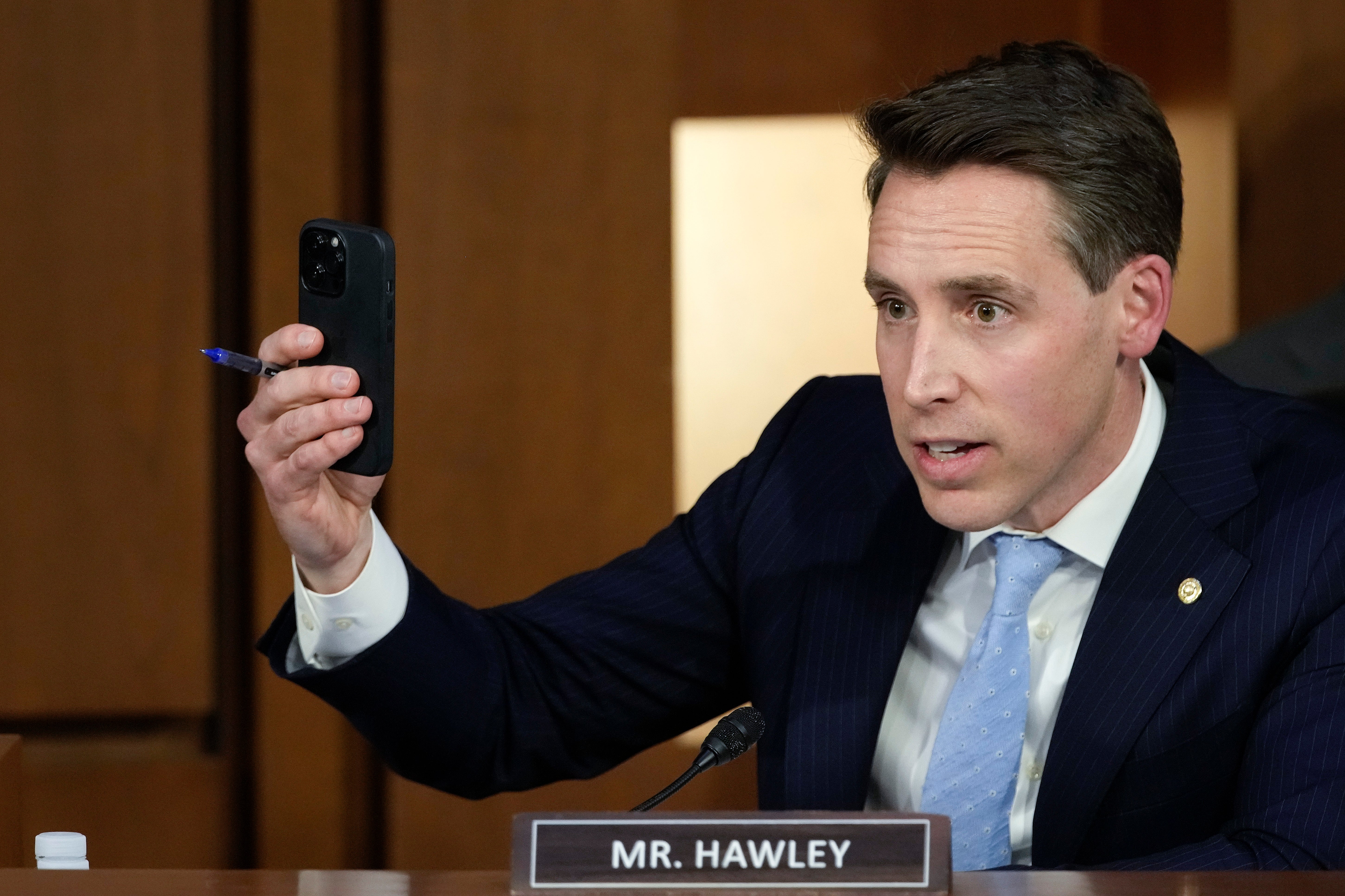The Independent's journalism is supported by our readers. When you purchase through links on our site, we may earn commission.
Copyright reform is vital – but Hawley’s proposals are a homophobic attack on free speech
The Missouri conservative is less interested in balancing freedoms and incentives in art than in using the subject as a fascist political cudgel


Your support helps us to tell the story
From reproductive rights to climate change to Big Tech, The Independent is on the ground when the story is developing. Whether it's investigating the financials of Elon Musk's pro-Trump PAC or producing our latest documentary, 'The A Word', which shines a light on the American women fighting for reproductive rights, we know how important it is to parse out the facts from the messaging.
At such a critical moment in US history, we need reporters on the ground. Your donation allows us to keep sending journalists to speak to both sides of the story.
The Independent is trusted by Americans across the entire political spectrum. And unlike many other quality news outlets, we choose not to lock Americans out of our reporting and analysis with paywalls. We believe quality journalism should be available to everyone, paid for by those who can afford it.
Your support makes all the difference.Our current copyright regime is much too restrictive. Intellectual copyright now ties up books, movies, songs, poems, and art for generations, making it difficult to impossible for scholars, critics, and other artists to push back against or expand upon relevant cultural conversations. New art is made from old art. A too restrictive copyright regime is therefore bad for art and bad for free speech.
Missouri Senator Josh Hawley has introduced a bill to reduce copyright terms. Which should be a good thing. But this is Josh Hawley, supporter of insurrection and vortex of awfulness. So his bill to reduce copyright terms does not defend free speech and support artists. It does the opposite of those things.
Hawley’s bill is not really intended to fix copyright. It’s intended to punish Disney for its (mild, tentative) support for LGBT causes. After Florida passed a “Don’t Say Gay” bill criminalizing discussion of LGBT issues in schools, Disney protested. Florida Governor Ron DeSantis responded by passing a law meant to revoke Disney’s special district status, which gives the company some self-governing authority within Disney World.
Hawley, like DeSantis, is running for President, and he wanted to show that he hates Disney and LGBT people too. Thus his new copyright bill, which breaks new grounds in unseriousness and unconstitutionality.
Currently, copyright for most works is the life of the author plus 70 years. In works made for hire (including the bulk of Disney’s intellectual property), copyright extends 95 years from publication. So the first Captain America comic, published in 1941, would enter the public domain in 2036, at which point anyone could reprint it. (Using Captain America in a new movie would still run afoul of Disney’s trademark, however.)
Hawley proposes dialing copyright back to only 28 years, with a potential for renewal of another 28 years. This was the copyright regime in 1909. The new system would take effect for all new works.
Old works would retain their old copyrights … unless they belong to a company that was market capitalization of more than $150 billion. Any company with that much capitalization — which is basically Disney, and also Disney — would have the new copyright terms apply retroactively. That means that Disney would lose the copyright in much of its intellectual property, from mouse to Marvel.
Taking property without compensation is unconstitutional. More, this is clearly an effort to punish Disney for speaking against homophobic legislation. The government using legislation to target corporations for speech it doesn’t like is an egregious violation of the First Amendment.
There are many reasons to be disgusted with Hawley’s clownish, tyrannical bigotry. But for anyone who cares about art and copyright, his effort to use these laws to restrict free speech provokes additional bonus nausea.
The original constitutional purpose of intellectual property law according to the Constitution is to “promote the progress of science and useful arts.” Copyright is specifically meant not to protect property, or enrich artists, but to enrich art.
The framers believed that giving artists a monopoly in reproducing and distributing their art would encourage people to be creative. You’re more likely to write a novel if you can be sure that you’ll be able to make money from that novel. No one can just reprint it and sell it and get the benefit of your labor for themselves.
However, artists and creative people also benefit when art is free. A scholar analyzing the original Captain America comic, for example, will be able to make their points more clearly if they can include panels from that original comic in their article. A filmmaker creating a documentary about Disney may want to include clips from Disney movies in their work. A hip hop artist writing a song about Disney might want to use samples from Marvel movies, or music from old cartoons.
Art often comments on and builds on older art. That means that copyright needs to balance incentives and freedoms, and to balance profits from old work with freedom for new creations.
Currently our copyright regime tilts much too far in favor of protections for legacy companies. Disney has been at the forefront of greater copyright protections; it was instrumental in pushing the copyright extension of 1998, which pushed protection for the first Mickey Mouse cartoons to 1924.
This extension was a financial bonanza for Disney, but did little to encourage art, especially since it applied retroactively. No one is going to make old Mickey Mouse cartoons again, since they already exist. The purpose of copyright is to encourage creation. Extending copyright on works that have already been created is clearly counter-productive.
In contrast, long copyrights have made certain kinds of art impossible. Seminal hip hop albums from the late 80s and early 90s like de la Soul’s 3 Feet High and Rising or the Beastie Boy’s Paul’s Boutique used adventurous collage techniques employing hundreds of recognizable samples. But since copyright extends to almost all of recorded music, these techniques opened the artists up to extensive lawsuits. De la Soul’s early albums are still unavailable on digital platforms because of the difficulty in clearing samples.
Hip hop learned its lesson; no one makes music like that anymore. Which is a major failure of a copyright regime which, again, according to the Constitution, is supposed to encourage art, not stifle it.
A copyright law which ran 60 years from release would mean that all music, art, film, and comics released in 1962 would now be out of copyright and available for reproduction, commentary, sampling, and remixing. Creators would still be assured of 60 years of control of their work—and would have a large repository of art that they could use to build that work without worrying about Disney, or anyone, suing them. That would be to the benefit of art.
But Hawley, obviously, doesn’t care about benefiting art. His cynical dream of copyright as a fascist political cudgel only makes principled copyright reform less likely than ever. Copyright should be a way to encourage expression, speech, and art. Disney in the past has twisted it so that it discourages them instead. But Josh Hawley wants you to know that he can do even worse.
Join our commenting forum
Join thought-provoking conversations, follow other Independent readers and see their replies
Comments